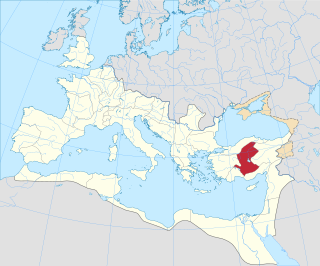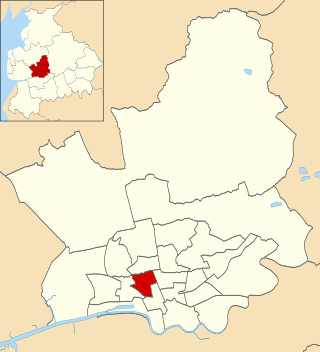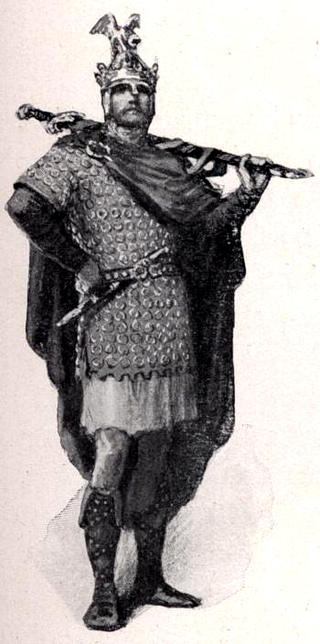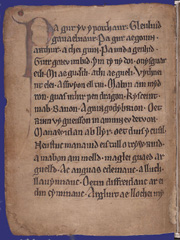
The Brittonic languages form one of the two branches of the Insular Celtic languages; the other is Goidelic. It comprises the extant languages Breton, Cornish, and Welsh. The name Brythonic was derived by Welsh Celticist John Rhys from the Welsh word Brython, meaning Ancient Britons as opposed to an Anglo-Saxon or Gael.

King Arthur, according to legends, was a king of Britain. He is a folk hero and a central figure in the medieval literary tradition known as the Matter of Britain.

The Round Table is King Arthur's famed table in the Arthurian legend, around which he and his knights congregate. As its name suggests, it has no head, implying that everyone who sits there has equal status, unlike conventional rectangular tables where participants order themselves according to rank. The table was first described in 1155 by Wace, who relied on previous depictions of Arthur's fabulous retinue. The symbolism of the Round Table developed over time; by the close of the 12th century, it had come to represent the chivalric order associated with Arthur's court, the Knights of the Round Table.
Cumbric is an extinct Celtic language of the Brittonic subgroup spoken during the Early Middle Ages in the Hen Ogledd or "Old North", in Northern England and the southern Scottish Lowlands. It was closely related to Old Welsh and the other Brittonic languages. Place-name evidence suggests Cumbric may also have been spoken as far south as Pendle and the Yorkshire Dales. The prevailing view is that it became extinct in the 12th century, after the incorporation of the semi-independent Kingdom of Strathclyde into the Kingdom of Scotland.

Galatian is an extinct Celtic language once spoken by the Galatians in Galatia, in central Anatolia, from the 3rd century BC up to at least the 4th century AD. Some sources suggest that it was still spoken in the 6th century. Galatian was contemporary with, and closely related to, Gaulish.

The historicity of King Arthur has been debated both by academics and popular writers. While there have been many claims that King Arthur was a real historical person, the current consensus among specialists on the period holds him to be a mythological or folkloric figure.

Bewnans Ke is a Middle Cornish play on the life of Saint Kea or Ke, who was venerated in Cornwall, Brittany and elsewhere. It was written around 1500 but survives only in an incomplete manuscript from the second half of the 16th century. The play was entirely unknown until 2000, when it was identified among the private collection of J. E. Caerwyn Williams, which had been donated to the National Library of Wales after his death the previous year. The discovery proved one of the most significant finds in the study of Cornish literature and language.
Celliwig, Kelliwic or Gelliwic is perhaps the earliest named location for the court of King Arthur. It may be translated as 'forest grove'.
Cynddylan, or Cynddylan ap Cyndrwyn was a seventh-century Prince of Powys associated with Pengwern. Cynddylan is attested only in literary sources: unlike many kings from Brittonic post-Roman Britain, he does not appear in the early Welsh genealogies or other historical sources. The son of King Cyndrwyn, Cynddylan is described in the probably seventh-century poem Marwnad Cynddylan and seems to have been a chieftain in Powys.
Western Brittonic languages comprise two dialects into which Common Brittonic split during the Early Middle Ages; its counterpart was the ancestor of the Southwestern Brittonic languages. The reason and date for the split is often given as the Battle of Deorham in 577, at which point the victorious Saxons of Wessex essentially cut Brittonic-speaking Britain in two, which in turn caused the Western and Southwestern branches to develop separately.
Oliver James Padel is an English medievalist and toponymist specializing in Welsh and Cornish studies. He is currently Honorary Research Fellow in the Department of Anglo-Saxon, Norse, and Celtic, in the University of Cambridge. and visiting professor of Celtic at the University of the West of England

Tulketh is an electoral ward in Preston, Lancashire, England. The Tulketh Mill is a notable landmark in the ward.

King Arthur's family grew throughout the centuries with King Arthur's legend. Many of the legendary members of this mythical king's family became leading characters of mythical tales in their own right.

King Arthur's messianic return is a mythological motif in the legend of King Arthur, which claims that he will one day return in the role of a messiah to save his people. It is an example of the king asleep in mountain motif. King Arthur was a legendary 6th-century British king. Few historical records of Arthur remain, and there are doubts that he ever existed, but he achieved a mythological status by High Middle Ages that gave rise to a growing literature about his life and deeds.
Cornish surnames are surnames used by Cornish people and often derived from the Cornish language such as Jago, Trelawney or Enys. Others have strong roots in the region and many in the UK with names such as Eddy, Stark or Rowe are likely to have Cornish origins. Such surnames for the common people emerged in the Middle Ages, although the nobility probably had surnames much earlier on. Not until the later Middle Ages did it become necessary for a common man to have a surname. Most surnames were fully established throughout Cornwall by the end of the 15th century. Cornish surnames can be found throughout the world as part of the Cornish diaspora.

The Battle of Hingston Down took place in 838, probably at Hingston Down in Cornwall between a combined force of Cornish and Vikings on the one side, and West Saxons led by Ecgberht, King of Wessex on the other. The result was a West Saxon victory. According to the Anglo-Saxon Chronicle, which called the Cornish the West Welsh:
Canu Heledd are a collection of early Welsh englyn-poems. They are rare among medieval Welsh poems for being set in the mouth of a female character. One prominent figure in the poems is Heledd's dead brother Cynddylan.

Poem 31 of the Black Book of Carmarthen, a mid-13th century manuscript, is known from its first line as Pa gur yv y porthaur? or Pa gur, or alternatively as Ymddiddan Arthur a Glewlwyd Gafaelfawr. It is a fragmentary, anonymous poem in Old Welsh, taking the form of a dialogue between King Arthur and the gatekeeper Glewlwyd Gafaelfawr, in which Arthur boasts of his own exploits and those of his companions, especially Cai the Fair. Pa gur is notable for being one of the earliest vernacular Arthurian works, and for alluding to several early adventures of Arthur which are now lost. Its precise age is not known and has been the subject of wide-ranging disagreement, but scholarly opinion now tends to favour a date of c. 1100.
"Gorhoffedd Hywel ab Owain Gwynedd", sometimes known in English as "Hywel's Boast", has historically been considered a poem by the mid-12th-century prince, warrior and poet Hywel ab Owain Gwynedd. However, some scholars now believe it to be two quite separate poems by Hywel which have become fused together in the process of manuscript transmission. It is his best-known work. In the first half the poet expresses his love of his native Gwynedd – its scenery, its men and women – and boasts of his own prowess in defending them; in the second he praises several Welsh ladies and tells us how many of them are sexual conquests of his. According to the writer Gwyn Williams, "The sharpness and clarity of the North Wales landscape has never been so well caught in words, nor have tenderness and humour been better mingled in the expression of love".












